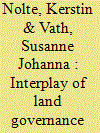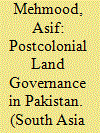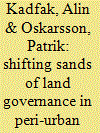|
|
|
Sort Order |
|
|
|
Items / Page
|
|
|
|
|
|
|
| Srl | Item |
| 1 |
ID:
146113


|
|
|
|
|
| Summary/Abstract |
This comparative analysis examines how large-scale agricultural land acquisitions are implemented in Ghana and Kenya, using embedded case studies of two specific investment projects. We find that insufficiencies in these countries' land governance systems are partly caused by discrepancies between de jure and de facto procedures and that powerful actors tend to operate in the legal grey areas. These actors determine the implementation of projects to a large extent. Displacement and compensation are highly emotive issues that exacerbate tensions around the investment. We also find that large-scale land acquisitions have a feedback effect on the land governance system, which suggests that large-scale land acquisitions can be drivers of institutional change. We suggest there may be a window of opportunity here to reform these land governance systems.
|
|
|
|
|
|
|
|
|
|
|
|
|
|
|
|
| 2 |
ID:
155007


|
|
|
|
|
| Summary/Abstract |
This paper argues that violent conflict prominently impacts on land governance and so contributes to land conflicts in post-conflict settings. In the natural resources literature, the relationship between land and conflict is often explained in terms of environmental security or political ecology, and many have pointed out that the way land is governed in itself may be a source of conflict. However, less attention has been given to the effects of violent conflict on land and its governance in post-conflict situations. This paper argues that violent conflict affects land governance in many ways and that this in turn might contribute to further violent conflict. The argument builds around an extended case study of the Apaa evictions in Amuru District in Northern Uganda. The case illustrates how conflict around land is not just the result of resource scarcity and competition, but is the outcome of a combination of political, historical and social dynamics. Past policies on land and practices of land governance play a critical role in this. However at the same time, violent conflict has a critical impact on land access, transforms land governance authority and the rules applied. The land conflicts resulting from this, in turn, fuel ethnic tensions between local population groups, and grievances about those in power and the institutions that govern natural resources. The ways in which such problematic conflict-induced changes in land access and governance are dealt with by policymakers is critical for post-conflict stability.
|
|
|
|
|
|
|
|
|
|
|
|
|
|
|
|
| 3 |
ID:
166885


|
|
|
|
|
| Summary/Abstract |
Current developments in Pakistan highlight the unresolved issue of proprietary rights for long-standing tenants of state-owned farms comprising thousands of acres in various districts of Punjab. The pendulum of state response to the hereditary claims of people who have lived and worked on this land for generations swings presently towards expropriation, rather than respect for rural people’s basic rights. The scenario is further complicated because the military is a significant party to these disputes. This article scrutinises the handling of these protracted disputes over land rights and identifies emerging patterns of land governance in Pakistan that will alter the future relationship of these farmers with the government. The article shows that in this specific case, the problems are not merely a continuation of traditional local feudal powers, but now relate to new postcolonial realities, especially Pakistan’s economic co-operation with China.
|
|
|
|
|
|
|
|
|
|
|
|
|
|
|
|
| 4 |
ID:
158933


|
|
|
|
|
| Summary/Abstract |
This article examines how unstable land on a sandy peninsula in peri-urban Mangaluru becomes part of urban land contestation to primarily support continued informal tenure. The peninsula is undergoing shifts changing both its shape and land use under the influence of a range of biophysical and human forces. For the time being, fisherfolk can remain in place despite lacking land documents, but much of the peninsula has been proposed for commercial development projects. The sand-spit thus becomes a frontier for variegated land claims part of urbanization processes where the variable ‘nature’ of land is enmeshed. Drawing on urban political ecology and Indian land governance literature, the article highlights how the fluctuating land supports continued informality since the shifting sands make boundaries challenging to delimit and maintain, and, once stabilised, can be claimed by the state. The informalising characteristics of land, understood as an ‘informality machine’, reinforces similar ongoing urban transformations along the entire coastline, to mainly favour elite interests, but can also be seized upon by the fisherfolk themselves for new claims, or workarounds aimed at securing long-term tenure. Future research on the urban land question would do well to include a perspective of land as co-constituted by socio-natural processes.
|
|
|
|
|
|
|
|
|
|
|
|
|
|
|
|
|
|
|
|
|